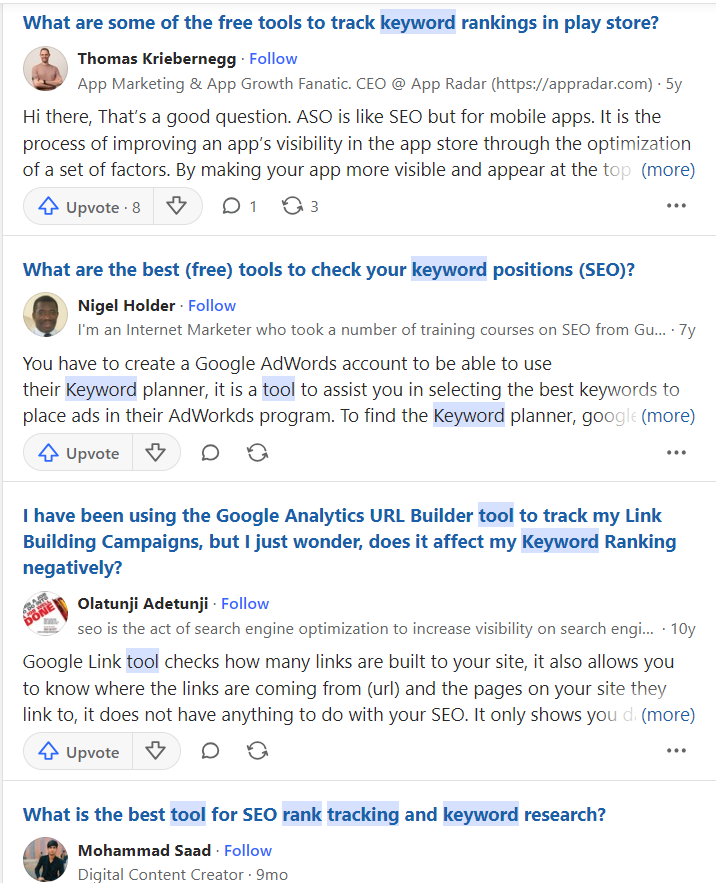A recent report shows that Google processes 8.5 billion searches daily. These searches have different search intent.
For example, a user might search “What is a keyword rank tracking software?” while another search “best keyword rank tracking software.” Both users have a similar keyword in their search query but with a different purpose.
The first needs general knowledge on the subject matter, while the other is telling Google loud and clear that there is money in the hand to buy or needs a little more education before making the purchase.
The latter doesn’t need an organic blog post that explains the nitty-gritty of the search term but a detailed review of the best tools available. These types of search phrases are known as commercial intent keywords.
Users who use these queries are hot leads at the middle of the funnel, preparing to take action. You can target these keywords and increase conversion even with less traffic.
In this article, we won’t just dive into how to find commercial intent keywords that require the world’s backlink to rank. We will teach you to find and track low-competition keywords with high commercial search intent, just like a skilled detective.
What Are High Commercial Intent Keywords?
Keywords with high commercial intent indicate that the user searching for them will likely make a purchase or complete some other commercial action like a subscription.
These keywords are precious for businesses because they often lead to conversions and sales. Let’s examine a few characteristics of these keywords:
- Transactional phrases: high commercial keywords often include action-oriented terms such as “buy,” “purchase,” “order,” “subscribe,” “discount,” “deal,” or “hire.” For example, “buy iPhone 13” or “hire a plumber.”
- Product or service-specific: commercial intent keywords are typically very specific and related to particular products or services. For instance, “red Nike running shoes” or “iPhone screen repair.”
- Local intent: keywords that include local modifiers like “near me,” “in [city],” or “close to [landmark]” indicate a strong intention to purchase in a specific geographic area. For instance, individuals who need pizza can search “pizza delivery near me” to check the list of restaurants with service options in their area.
- Brand names: searches that include brand names or trademarks often demonstrate a high commercial intent. People searching for “Apple iPhone” or “Nike sneakers” usually want to purchase related to those brands.
- Comparison keywords: keywords that involve product comparisons, such as “best,” “top-rated,” or “vs.,” indicate that the searcher is in the consideration phase and is likely looking for information to make a purchase decision. For example, “best digital cameras” or “iPhone vs. Samsung.”
- Price-related terms: keywords that include price-related terms like “cheap,” “discount,” “deal,” or “coupon” suggest that the searcher is interested in finding a good deal or a lower-priced option.
- Long-tail keywords: long-tail keywords are more specific and tend to have higher commercial intent. They often include multiple words and phrases that reflect a searcher’s detailed intent. For example, “organic, gluten-free dog food for small breeds.”
- Action-oriented questions: keywords in the form of questions that imply a desire for a solution to a problem or a purchase, such as, “Where can I buy a new refrigerator?” or “How much does it cost to install solar panels?”
- Urgency terms: keywords that indicate a sense of urgency, like “urgent,” “now,” or “today,” can signal a strong commercial intent. For instance, “emergency locksmith services” or “buy concert tickets today.”
- High bidding in PPC advertising: in paid search advertising, keywords with high commercial intent often command higher costs per click (CPC) in platforms like Google Ads because businesses are willing to pay more to target users closer to making a purchase.
Learn more: Read our blog post on search intent, detailing the different search intent keywords.
9 Ways to Find Low Competition Keywords With High Commercial Intent
Here are some practical steps for finding low-competition keywords that convert.
1. Speak With Your Customer Service Team
Cai Ellis, SEO Manager at Tooltester, explains this process in detail.
“The most overlooked tactic for finding low-competition keywords with high commercial intent, in my opinion, is speaking with customer service teams. The people monitor live chats and take calls from customers who have purchased your product/service or are looking to convert. This arm of the company has the best first-hand insights that can help you build your keyword-targeting strategy.”
Customer service teams are typically addressing problems customers experience when trying to convert.
Some of these obstacles might be new based on changing industry trends that competitors still need to pick up on or keyword research tools need to highlight to you.
This insight can inform marketing teams what content would be helpful to address customer queries.
Team up this new data with a keyword research tool to get insights into what customers are trying to find on your website.
To kick off these types of conversations, ask questions like:
- Are there any new problems customers have faced in the last three months?
- Are there any resources you typically point customers to that could be improved?”
2. Interview Your Customers
Micheal Wall, Founder of Codefixer, said, “ Your customers possess the hidden codes for the search terms you need.”
Just as you can generate a list of keywords by speaking with your customer service team, you can get more commercial intent keywords by interviewing your customers.
John Ozuysal, Founder of House of Growth, provided a detailed guide on how he stresslessly goes around this process.
- Add an extra question on all your sign-up flows: What problem are you trying to solve with [your product]?
- Make sure the question is open-ended and let people write their responses.
- Now, each time someone signs up, you will be able to understand how they phrase their problem (potential topic idea for you)
- You can run this for a month, and it will give you tons of problem-centric content ideas.
- After a month, you can slightly change the question to “What are you trying to achieve with [your product]? This question is similar to the other one but focuses more on the desired outcome than the pain point
3. Think Like A Customer
Decipher the ideas and intents of your potential clients by reading between the lines and getting inside their heads. Your cues, such as “buy now” and “product,” will guide you to what customers seek. Examine the psychology behind these search phrases to ensure they perfectly match the objectives of your SEO campaign.
Use modifiers like “buy” or “cheap” to add a personal touch to your keywords. It’s like opening a secret chest full of words that reflect the true aspirations of potential customers.
4. Analyze Review Sites to Study Your Competitors’ Product/Service Feedback
Check review sites to see what keywords recur on customer feedback.
You can check review sites like G2, ProductHunt, Capterra, Gartner, and more if you run a SaaS company. Small business owners can check review sites like Yellow Pages, Foursquare, and more.
John Ozuysal, Founder of House of Growth, again explains how he uses G2 to find keywords his brand’s competitors’ audience uses that focus on their desired needs.
- Go to G2’s website and search for your competitors.
- While checking reviews, pay special attention to the ” What problem is the product solving for you?” part
- Take note of the reasons people use your competitors’ products.
- Now you have a list of high commercial intent topics to write about.”
Let’s have a practical example.
Let’s use a review on Keyword.com as an example if you are on G2 and reading the “What problem is the product solving for you” part of a review by Jayendra.
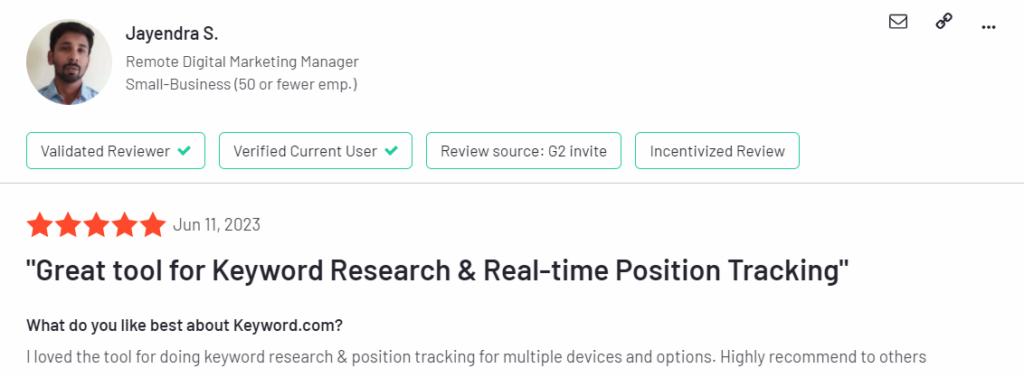
Jayendra mentioned that he loved the tool for doing keyword research and position tracking for multiple devices and options.
Armed with this information, you have a keyword with high commercial search intent ” best keyword tracking tool for multiple devices.”
You can constantly revamp the idea into different keywords to align with what you want.
5. Analyze Your Competitors’ Pages
Your competitors’ pages are like a goldmine, but here, what is mined isn’t gold but rich keywords.
Just enter your competitors’ URLs into any of your preferred competitor analysis tools and compare their keywords with yours.
Some tools provide the keywords your competitors rank for that you don’t. These keywords are your treasure gem. To dive deeper, use the ‘intent’ filter to narrow down the results and generate keywords with commercial search intent only.
Your choice of competitors should be based on similarity in service and product and not niche. Two sites can be in the same niche but offer different services/products.
6. Scrape Long-tail Keywords
Most low-competition keywords with high commercial intent are long-tail keywords. Some are short-tail keywords, but their numbers compared to long-tail keywords are like the ratio of the pride of a lion to a herd of buffalos.
Long-tail keywords are longer and more specific keyword phrases that visitors are more likely to use when they’re ready to buy.
That’s why Maggie McTavish, Founder of Mango Media, mentioned,
“Long-tail keywords are often more specific and less competitive; they resonate with users with clearer purchase intentions.”
To get these keywords, enter your seed phrases like your product category, the primary purpose of your product, or the service you offer into Google’s search bar and add a commercial intent modifier.
For example, an eCommerce store that sells shoes can have a product category on “hiking shoes.” Adding a commercial intent modifier like “best,” “buy,” “purchase,” and more generates a list of valuable long-tail keywords based on actual searches Google users have made.

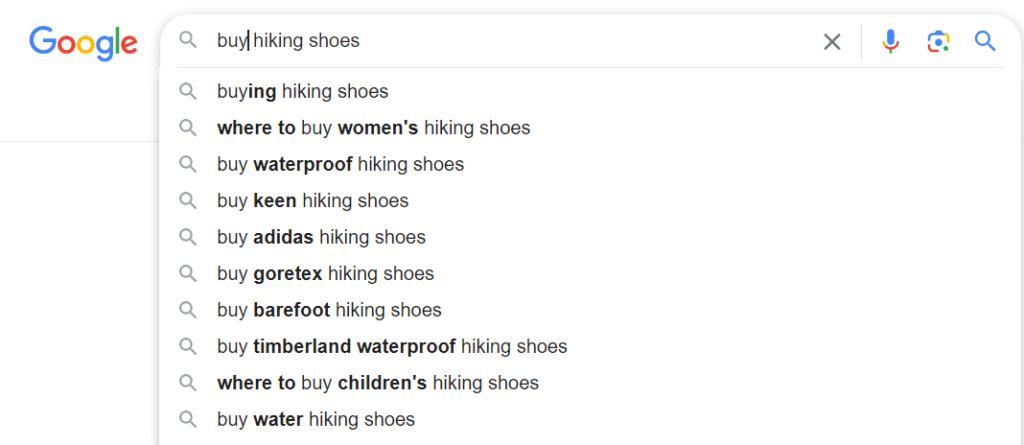
You can also check the People Also Ask and Related Searches segment of the SERPs for more keywords.
7. Leverage Q&A Forums
Use Quora and Reddit to find questions people ask about the purpose of your product/service.
For example, we generated a list of low-competition keywords with high commercial search intent for Keyword.com from Quora.
We entered the primary function of the software, which is keyword rank tracking on Quora, and we had an archive of questions that are keywords with high commercial intent.
We replicated the same process on Reddit and added many more commercial intent keywords to our keyword list.
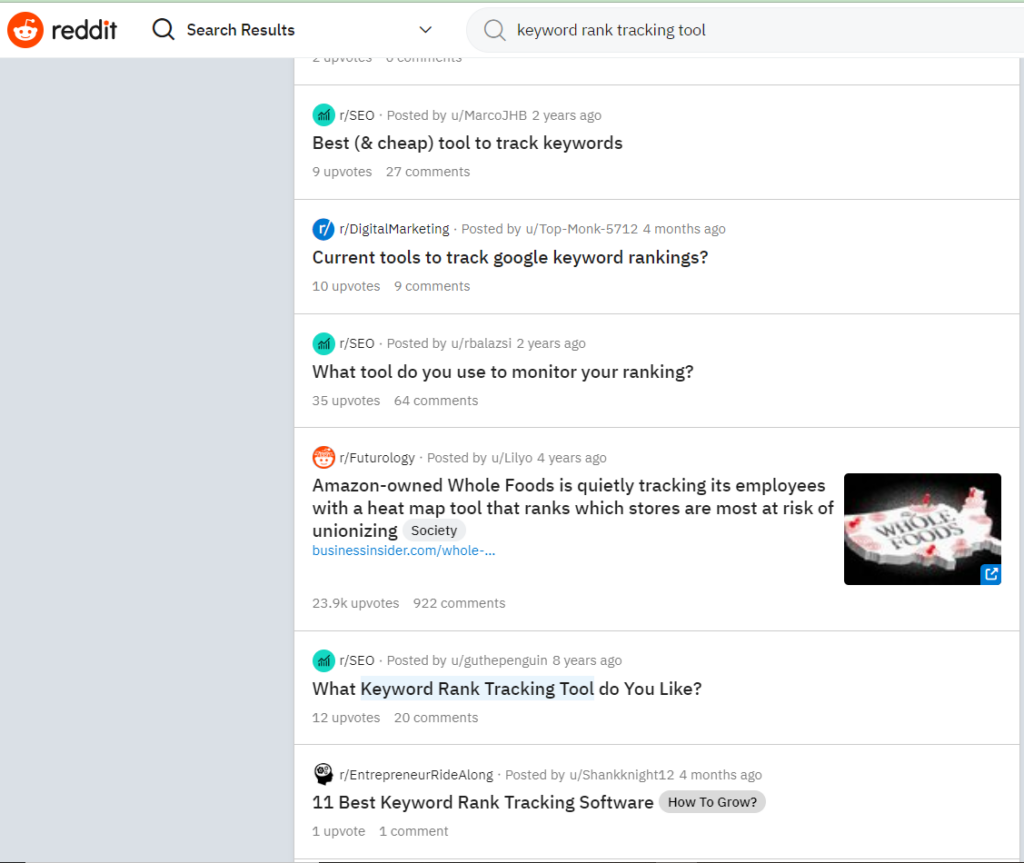
8. Analyze Your Google Search Console Data
Google Search Console is known for helping site owners monitor their website traffic and make more distinct decisions on their page search results.
But do you know you can use this Webmaster tool to find high commercial intent keywords with low keyword difficulty?
Your existing pages generate traffic from different sources and sometimes rank for keywords you didn’t target. These keywords are sometimes valuable and can cause more ROI to your site.
Just head up to your Google Search Console account and click Performance at the top left sidebar.
Next, click New and select Query.
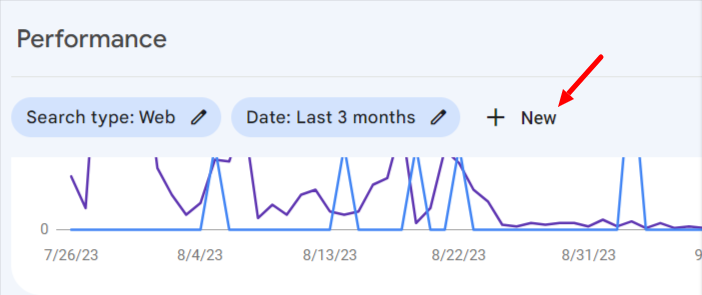
Select the Filter option and choose Queries containing. Enter the commercial intent modifiers into the keyword search bar and click Apply to find the keywords containing that modifier.
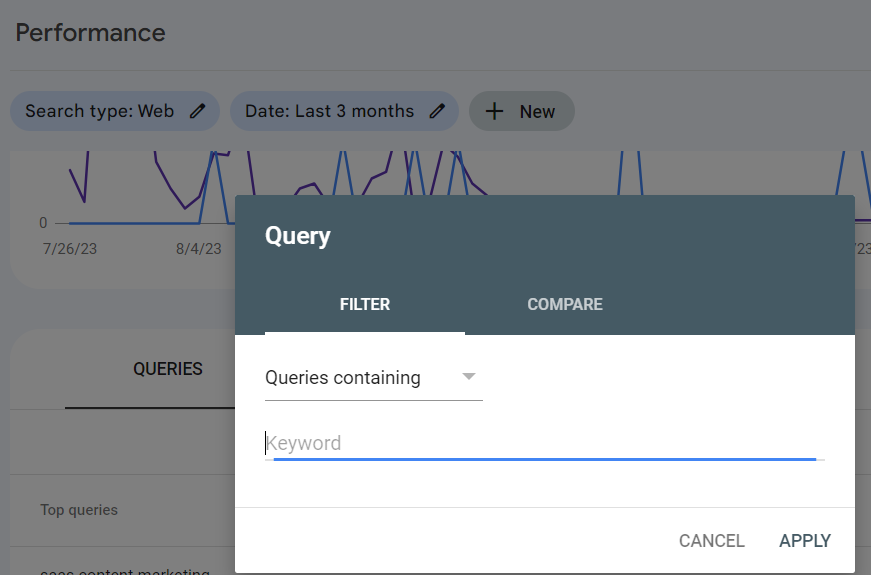
For example, if you type “vs,” the tool will generate all keywords containing that modifier. You can use several commercial intent modifiers to find several keywords.
9. Use Keyword Research Tools
You can use a keyword research tool to generate more ideas and analyze the keyword metrics of your already-built keyword list.
Keyword.com’s keyword suggestions feature makes generating more commercial intent keywords as easy as cracking a walnut.
Sign up for your account, create a new project, and enter your seed keyword or a bigger topic within your niche with a commercial intent modifier. The tool automatically generates a list of search queries customers use when they nearly want to buy or take action.
To generate more keyword ideas, you can add several commercial search intent modifiers like “best,” “review,” “vs,” “discount,” and more.
For example, an eCommerce store that sells dog food can use Keyword.com to find several queries search engine users use when they want to get the item.
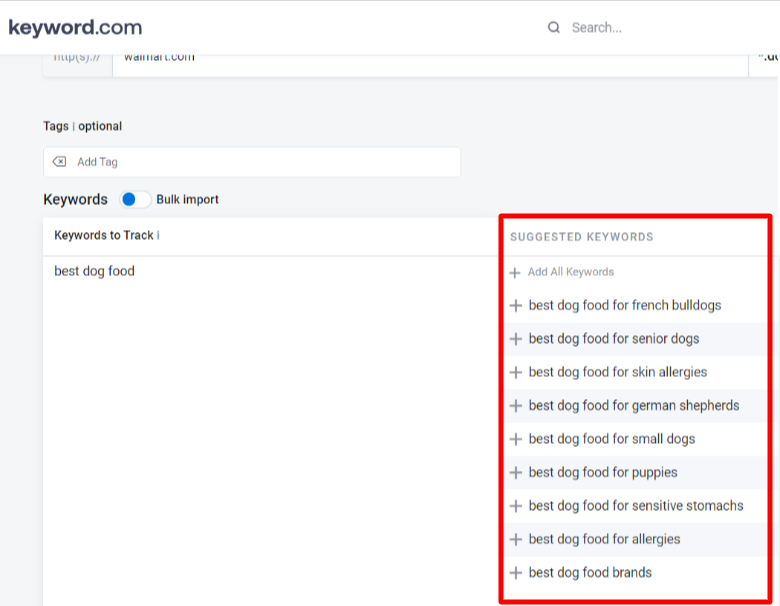
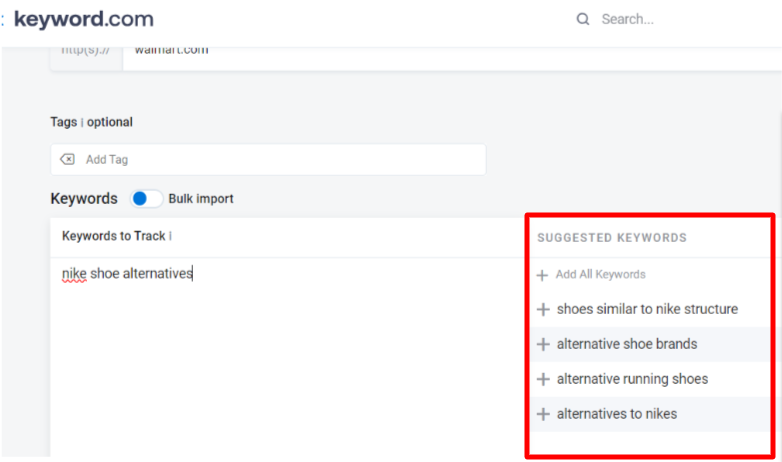
After building your keyword list, the next stage is to filter the weed from the field by analyzing the keyword metrics, i.e., keyword difficulty, search volume, and more. In this case, our focus is low-competition keywords with high commercial intent.
You can use a keyword tool like Google Keyword Planner to analyze your keywords. Log in to your Google Keyword Planner account and click Get Search Volume and Forecasts.
Enter your keywords manually or upload them as a CSV file.
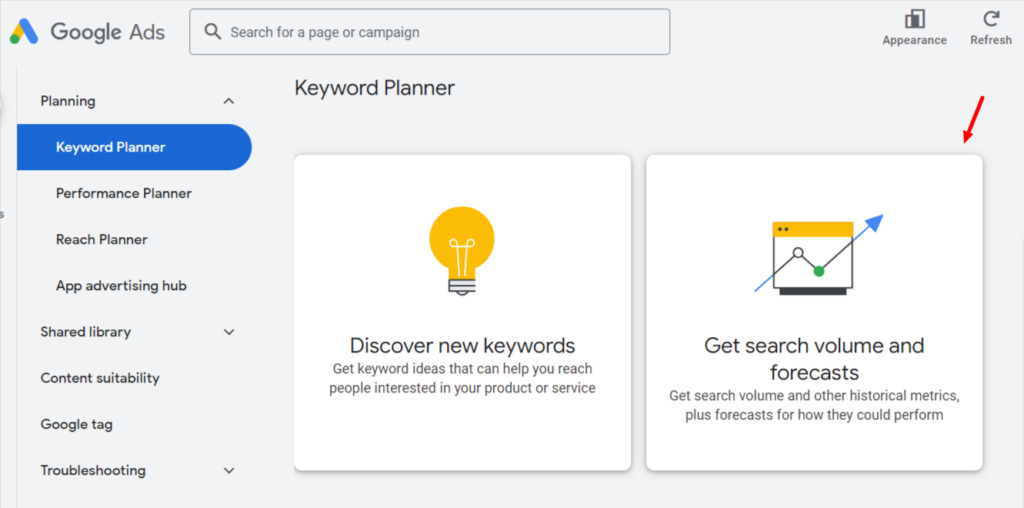
For example, let’s use the keywords generated with the Keyword.com keyword Suggestions tool.
Upload your keywords and click Get Started.
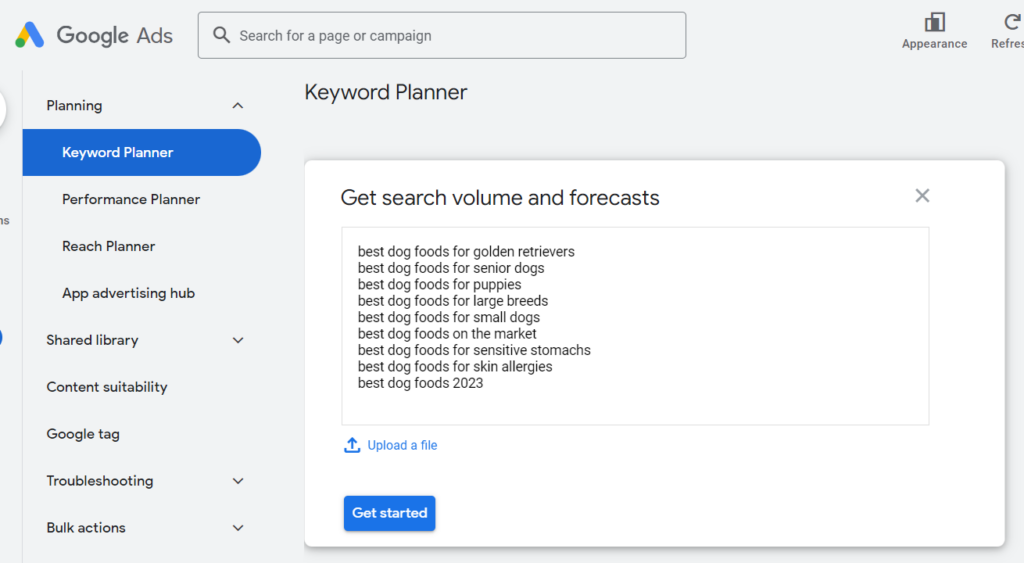
The software processes the keywords and provides details of their competition, average monthly searches, and more.
Highlight the keywords with low competition to have a finetuned list of valuable keywords for optimization.
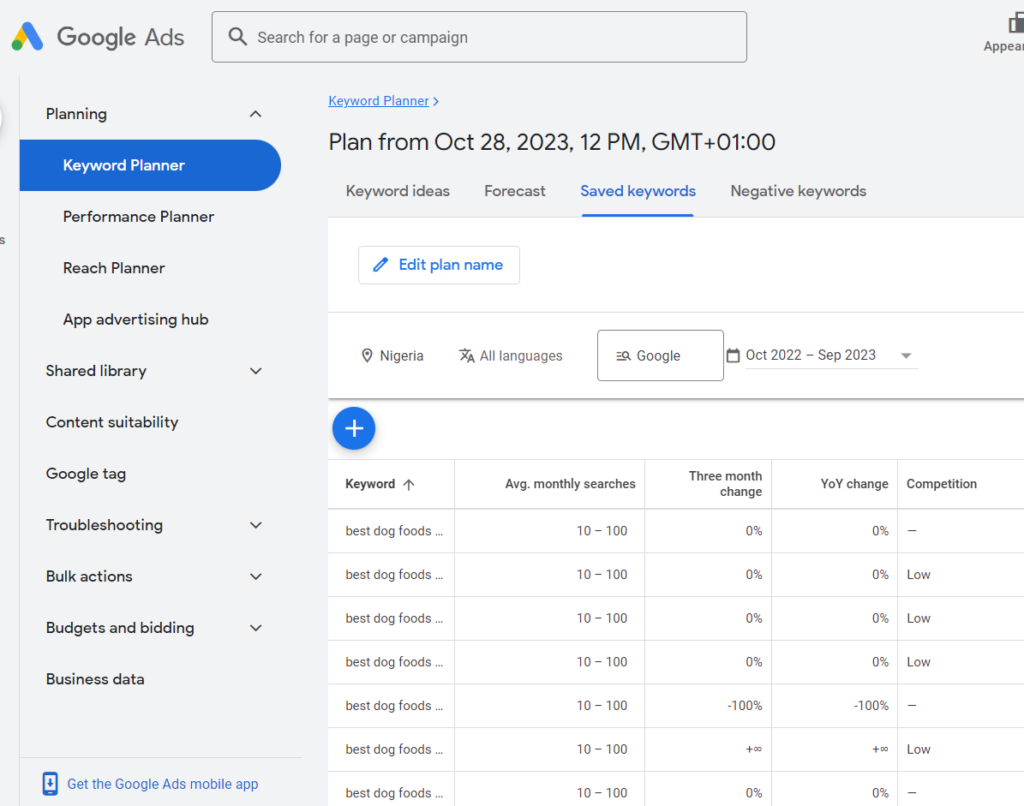
Importance of Targeting Commercial Keywords for Your Business
1. Easier Ranking
Since there is less competition, securing a top spot on the SERPs for low-competition keywords with high search intent is easier.
We created a blog post on a low-competition keyword with high commercial intent, “best SEO APIs for marketers,” and ranked on the first page in less than a week after publishing.
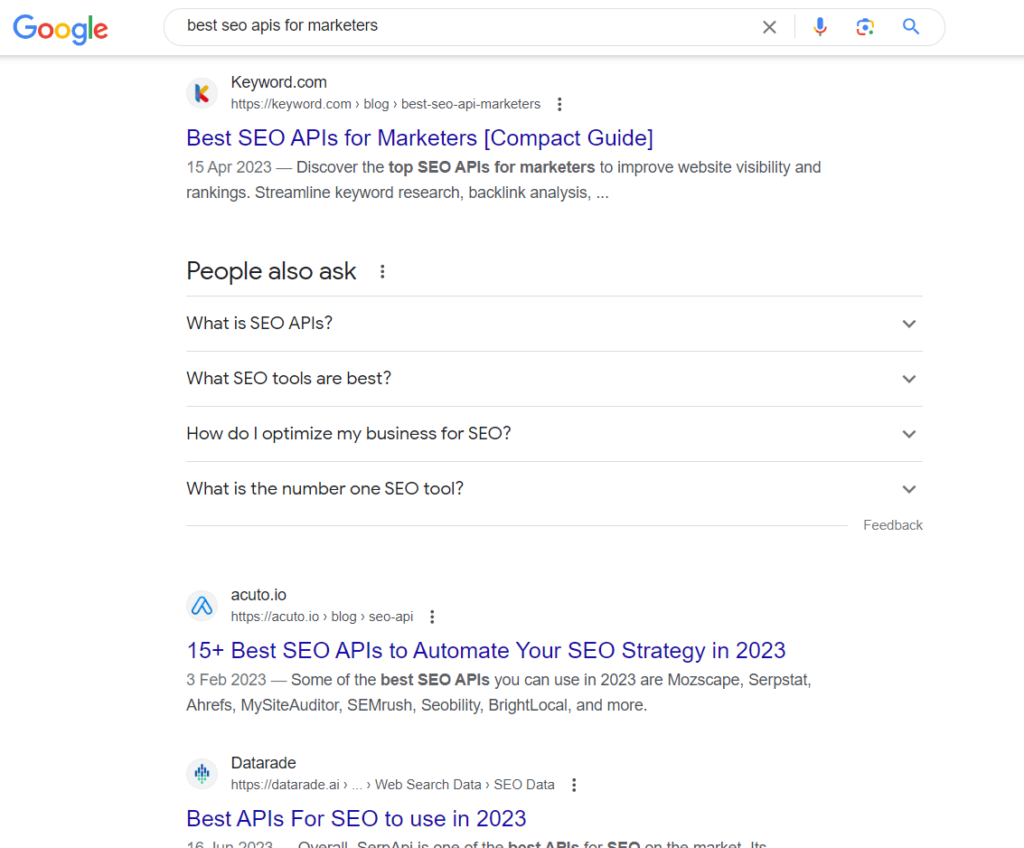
2. High Conversion Potential
Searchers who use commercial intent phrases are nearly likely to buy or take action. They don’t need to go through the route of learning afresh on the subject matter. Most importantly, they are already in the middle of the sales funnel—exactly where you want them to be.
All you need to do is appropriately optimize these keywords in your content and expect maximum return on investment.
3. Best for Paid Search Campaign
Paid search ads place your pages at the top of the search results, so searches are likely to click on them first.
Shopping ads, specifically, are attractive to search engine users with commercial intent and tend to get clicks from people looking to purchase a product or service.
Track Your Low Competition Keywords With Commercial Search Intent to Monitor Rankings
Keyword.com makes keyword rank tracking easier than said!
Sign up for any of the plans, create a new tag, dump your keywords, and the tool does the rest for you with your fingers crossed.
Keyword.com is distinct for its accuracy. The big brands have a lot of powerful features we’ll never build. But because they need to work on so many features at the same time, they can’t get every little thing right. Keyword.com specializes in keyword tracking. All our energy is put into making our tracker data better. And with better data, SEOs get an edge over their competitors.
That’s why multimillion-dollar SEO agencies trust this software as their go-to option for keyword position monitoring.
Steve Toth, SEO Consultant at SeoNotebook.com, mentioned this in his review.
“With Keyword.com, I just open a new tag and dump in my keywords, and it’s done. It’s so much faster and more nimble than any other tool.”
Here’s how it works:
- Sign up for any of the plans or start your free trial to have the tip of the iceberg.
- Create a new project. You can use your primary keyword as the project name.
- Enter your domain name and manually input your keywords or upload them as a CSV file.
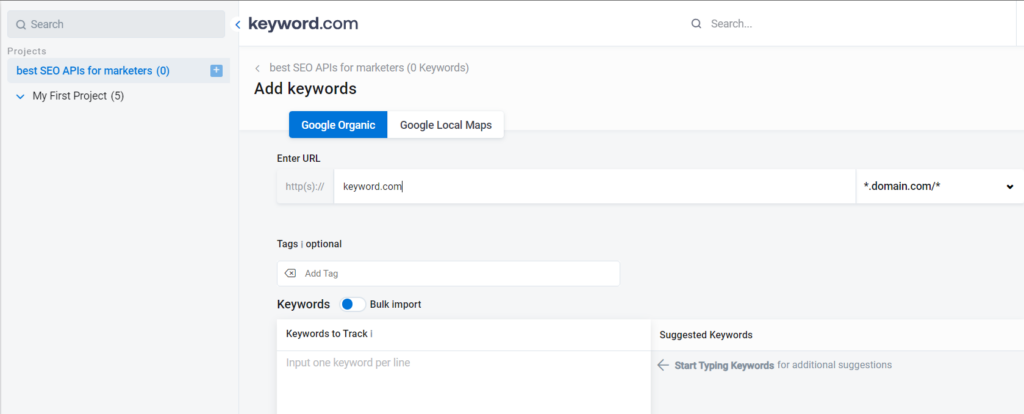
- Stroll downward to choose the device option you want to track, location, and language. The added advantage of streamlining your rank tracking process to your local area makes local keyword position tracking as easy as pie. You can choose your preferred city, postal code, or ZIP to monitor the performance of your local keywords.
Input the required data and click “Add Keywords.”
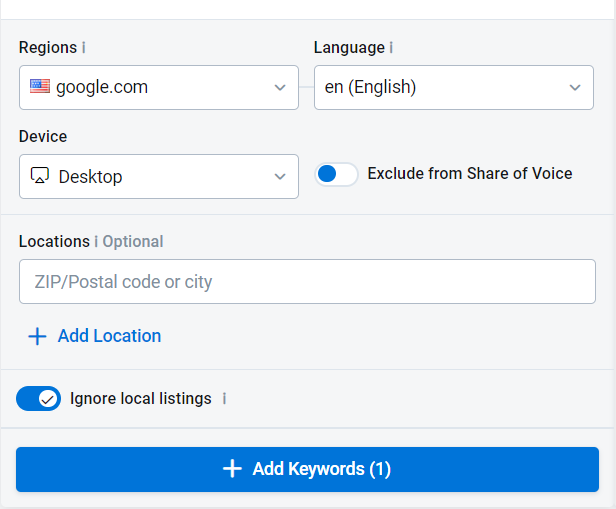
- The next page displays the performance of your keywords on SERPs, like a movie projected in the cinema. All segments are visible, with every metric properly analyzed.
The Share of Voice feature showcases how you are faring on the search results compared to your competitors. You can track competitor SERP rankings and understudy your keyword performance compared to your competitors as far back as 365 days.
You can use the tool’s one-click shareable report to send your company’s or clients’ live keyword performance. With this feature, every team member can access the ranking report without requiring sending endless emails.
Added advantage: Use Keyword.com rank tracker API and pull unlimited data from your account. You can transfer the data into your internal tool for your clients quickly. Interestingly, the API usage is based on your plan; there is no monthly limit or need for an upgrade.
Create Quality Content With Keyword.com
Discovering the most valuable keywords with low competition and high commercial search intent isn’t enough to convert those dream customers or generate your desired revenue.
You must create high-quality content optimized with keywords and search intent.
Keyword.com can help you identify the best keywords to target. Sign up for the most popular plan and track over 200 keywords daily with over 200 on-demand updates that help you outperform ranking fluctuations.
